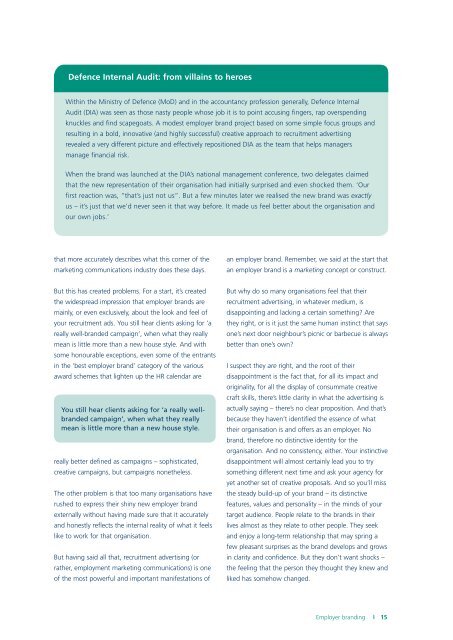Employer branding A no-nonsense approach - CIPD
Employer branding A no-nonsense approach - CIPD
Employer branding A no-nonsense approach - CIPD
You also want an ePaper? Increase the reach of your titles
YUMPU automatically turns print PDFs into web optimized ePapers that Google loves.
Defence Internal Audit: from villains to heroes<br />
Within the Ministry of Defence (MoD) and in the accountancy profession generally, Defence Internal<br />
Audit (DIA) was seen as those nasty people whose job it is to point accusing fingers, rap overspending<br />
knuckles and find scapegoats. A modest employer brand project based on some simple focus groups and<br />
resulting in a bold, in<strong>no</strong>vative (and highly successful) creative <strong>approach</strong> to recruitment advertising<br />
revealed a very different picture and effectively repositioned DIA as the team that helps managers<br />
manage financial risk.<br />
When the brand was launched at the DIA’s national management conference, two delegates claimed<br />
that the new representation of their organisation had initially surprised and even shocked them. ‘Our<br />
first reaction was, “that’s just <strong>no</strong>t us”. But a few minutes later we realised the new brand was exactly<br />
us – it’s just that we’d never seen it that way before. It made us feel better about the organisation and<br />
our own jobs.’<br />
that more accurately describes what this corner of the<br />
marketing communications industry does these days.<br />
But this has created problems. For a start, it’s created<br />
the widespread impression that employer brands are<br />
mainly, or even exclusively, about the look and feel of<br />
your recruitment ads. You still hear clients asking for ‘a<br />
really well-branded campaign’, when what they really<br />
mean is little more than a new house style. And with<br />
some ho<strong>no</strong>urable exceptions, even some of the entrants<br />
in the ‘best employer brand’ category of the various<br />
award schemes that lighten up the HR calendar are<br />
You still hear clients asking for ‘a really wellbranded<br />
campaign’, when what they really<br />
mean is little more than a new house style.<br />
really better defined as campaigns – sophisticated,<br />
creative campaigns, but campaigns <strong>no</strong>netheless.<br />
The other problem is that too many organisations have<br />
rushed to express their shiny new employer brand<br />
externally without having made sure that it accurately<br />
and honestly reflects the internal reality of what it feels<br />
like to work for that organisation.<br />
But having said all that, recruitment advertising (or<br />
rather, employment marketing communications) is one<br />
of the most powerful and important manifestations of<br />
an employer brand. Remember, we said at the start that<br />
an employer brand is a marketing concept or construct.<br />
But why do so many organisations feel that their<br />
recruitment advertising, in whatever medium, is<br />
disappointing and lacking a certain something? Are<br />
they right, or is it just the same human instinct that says<br />
one’s next door neighbour’s picnic or barbecue is always<br />
better than one’s own?<br />
I suspect they are right, and the root of their<br />
disappointment is the fact that, for all its impact and<br />
originality, for all the display of consummate creative<br />
craft skills, there’s little clarity in what the advertising is<br />
actually saying – there’s <strong>no</strong> clear proposition. And that’s<br />
because they haven’t identified the essence of what<br />
their organisation is and offers as an employer. No<br />
brand, therefore <strong>no</strong> distinctive identity for the<br />
organisation. And <strong>no</strong> consistency, either. Your instinctive<br />
disappointment will almost certainly lead you to try<br />
something different next time and ask your agency for<br />
yet a<strong>no</strong>ther set of creative proposals. And so you’ll miss<br />
the steady build-up of your brand – its distinctive<br />
features, values and personality – in the minds of your<br />
target audience. People relate to the brands in their<br />
lives almost as they relate to other people. They seek<br />
and enjoy a long-term relationship that may spring a<br />
few pleasant surprises as the brand develops and grows<br />
in clarity and confidence. But they don’t want shocks –<br />
the feeling that the person they thought they knew and<br />
liked has somehow changed.<br />
<strong>Employer</strong> <strong>branding</strong>

















